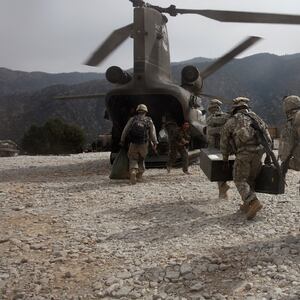KABUL, Afghanistan—The Biden administration’s mission to secure a U.S.-brokered Taliban-Afghan peace deal in time for a May 1 withdrawal of American troops is imploding by the day, with insider sources from both the Taliban and Afghan government telling The Daily Beast that the final push to reach an agreement is doomed to fail.
Experts say that the peace deal—an eight-page version of which has been reviewed by The Daily Beast—has all the makings of a rushed and desperate bid. But that hasn’t kept U.S. officials from relentlessly pressuring all sides to accept its terms, even going so far as to support peace talks hosted by long-time rival Russia.
Despite American fervor to meet the original exit deadline set by former President Trump, stunted peace negotiations and a substantial uptick in violence in the country have convinced Afghan officials that Biden is on the verge of halting the withdrawal instead of continuing to push for a bad deal.
“This is very rushed, and rushed in a way that increases the risk of a complete failure,” a senior security official in the Afghan government involved in the negotiations told The Daily Beast. “They do seem desperate, but I don’t exactly know for what reason. Because they aren’t going to leave Afghanistan now or later or ever,” the official said.
Sources within U.S. forces in Afghanistan said they still haven’t been told when they’d be exiting the country. “We're awaiting a policy decision from the White House. Until then, we're holding at the previously announced 2,500,” one of the sources, who agreed to speak with The Daily Beast on the condition of anonymity, said.
The nail-biting suspense of “will they, won’t they” leave received an equivocating response last week, when Biden told ABC news that a May 1 withdrawal “could happen, but it is tough.” And even if the U.S. did stay beyond the date, the president promised that it would not be “a lot longer.”
A gathering in Moscow, held last Thursday, helped revive talks between the warring parties. It came just days after a letter from U.S. Secretary of State Anthony Blinken was leaked to local media in Afghanistan. The letter urged Afghan President Ashraf Ghani to act swiftly on making a deal with the Taliban—a deal which appeared to have already been drafted by U.S. officials.
“We are considering a full withdrawal by May 1, as we consider other options… I am making this clear to you so that you understand the urgency of my tone regarding the collective work outlined here,” Blinken wrote in the letter.
Meanwhile, U.S. special envoy Zalmay Khalilzad has utilized every platform, including Moscow, to push the parties to sign the proposed deal. The eight-page draft, drawn out with much detail about the nature of a post-peace Afghan government, bypasses many of the original “red lines” set by Afghan officials.
Among other things, the deal proposes a power-sharing government between current democratically elected Afghan officials and the Taliban. It also suggests the adoption of a new constitution—a serious red line for many Afghans, particularly women, who see it as a violation of their protected rights and freedoms. The draft also lays out a plan for assimilating Taliban members into the current parliament, or suspending it altogether for the tenure of the interim government.
The blunt tone of Blinken’s letter, coupled with the meticulously chalked-out deal, seem to convey utmost urgency by the U.S. to exit Afghanistan—even if it means leaving Afghan officials vulnerable and with little agency.
“Biden has never been a big fan of the extensive U.S. involvement in Afghanistan,” Dr. Jonathan Schroden, director at CNA, a nonprofit research and analysis organization, told The Daily Beast. “Recall he once told then-President Karzai that Pakistan is “50 times more important” to the U.S. than Afghanistan. I don’t see any reason to believe his perspective on that would be different now,” he reasoned.
Schroden implied that the immediate urgency might have less to do with Biden’s convictions on Afghanistan and more to do with the former president’s poorly formulated deal.
“The Trump administration painted Biden into a corner with this May 1 deadline. The options that were handed to Biden were effectively—a) withdraw and watch the Afghan government fall apart; b) stay and watch the peace process fall apart; or c) negotiate for a limited extension that would likely accomplish very little and put you back to a choice between a or b in the not-too-distant future,” he explained.
The U.S. administration’s recent overtures seem designed to both get the U.S. out of Afghanistan and to break the paradigm of choices by arranging a power-sharing deal among Afghan elites, including the Taliban, Schroden explained.
A former Taliban minister described the peace process as more grueling than the everyday violence taking place in the country. “The peace process is much more difficult than the fighting in Afghanistan. But whether the U.S. leaves or remains in Afghanistan, in both cases, fighting and destruction will remain in Afghanistan’s destiny,” he told The Daily Beast.
The insider explained that the Taliban was reluctant about agreeing to ceasefires, arguing that it would be difficult to rebuild their forces if they were allowed to drift away during a pause in fighting. He also made it clear that power-sharing is of limited appeal to the fundamentalists.
“War is an ongoing but normal process for the Taliban and Afghans. We are not power crazy like other political figures desperate to be in government in Kabul. Without a full Islamic regime, I doubt we would give up the jihad,” said the ex-Taliban minister.
Regardless of whether the U.S. decides to leave or stay, many Afghan officials feel betrayed by their closest ally and have resigned to a fate where there are no favorable outcomes.
“There’s no best-case scenario now. There are only bad-case scenarios,” the Afghan senior security official said. “The U.S. staying is one problem. The U.S. not staying is another problem. They got rid of the best-case scenarios with what they did over the last two years.”
—With additional reporting by Sami Yousafzai






